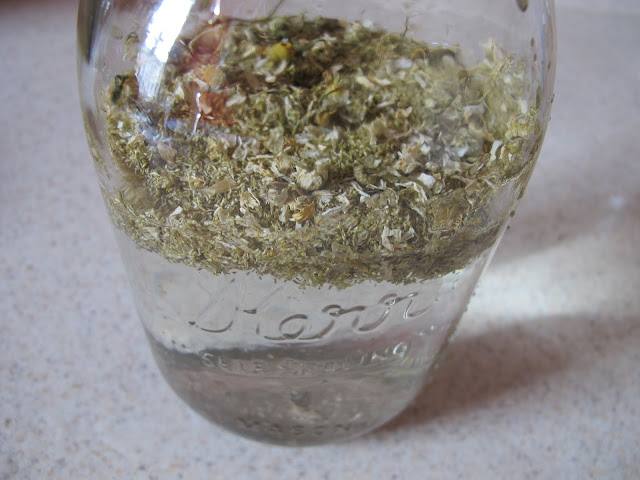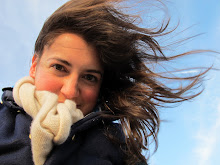After a musical fall and spring, performing with the San Francisco Lyric Chorus, I decided to take the summer off from singing. This doesn't mean of course that I'm not still belting out tunes on long car rides—ever heard this or this? What it does mean, of course, is that I have an extra free night every week. Oh, the possibilities! I played around with a few ideas—an Intro to Ceramics class being one of them, or maybe throwing another yoga class into my weekly routine. I decided to go with pursuing an interest I've slowly been developing over the past year or so: holistic health. I did some research and found a class at the Ohlone Center for Herbal Studies: welcome to an Introduction to Herbal Medicine.
First, here's a quick overview of the class that I pulled from their website:
A class for the beginner who wants to bring herbs into their everyday life. We will explore the many facets of herbs and herbal medicine. Class will cover basic human physiology and common herbal remedies for each body system. Students will learn to prepare a number of herbal products, including herbal extracts, salves, lotions, syrups and teas. This class includes an herb walk to a local natural area.
It sounded new and different, but also quite helpful. For a long time there I didn't know that there was an alternative to Western medicine and, of course, in certain life threatening situations there is no alternative. However, when it comes to specific cases (such as chronic condition, or skin disorders, or even the common cold) I believe there can be a cleaner, more intuitive approach.
For example, I have developed exhausting allergies over the past year. Clariton is great and all, but do I have to take it every day during allergy season for the rest of my life? This is the type of question I began asking myself. When I discovered this class I figured I might get some answers.
Last week we had our first class and it was like nothing I could have imagined. Herbal Medicine is an art and a science (and for someone like me, who struggled with science in school and would consider myself more of an artsy type, this was good news). For the first half, we covered two systems of the body: the Digestive System and the Nervous System. I took copious notes. My mind was blown when one of our teachers said that most disease begins in the gut. In a way, we interact with the world through this system, so it makes sense. It's little nuggets like these that make this class so interesting.
Then, our teachers passed around different types of herbs: Dandelion root, German chamomile, Mugwort, Ginger root, Cinnamon bark. We tasted them in their dry form, and also as tinctures (a liquid extract that is part herb, part liquid). A great way to incorporate tinctures into your daily routine is to put a few drops into a small class of lemon water or, better yet, put into your honey when adding to your tea.
Much of what we sampled had a bitter taste, and some were sweet and spicy. Cinnamon bark, for example, made my mouth feel dry. It has an astringent effect, sucking water out. Not to be too graphic, but can you guess how this could help with certain digestive problems? But that's what I love about this class. We speak freely (we are a small group of women) and we are open about common ailments and the strong desire to soothe the pain or discomfort we feel. An approach of Western herbal medicine is not to fight the disease, but to work with it. Given that it's part of our body, why would we want to be at war with ourselves? I find this all fascinating. Do you?
Our homework assignment was so make hot and cold infusions of two different herbs: Dandelion root and Chamomile. Dandelion root, or as the herbalists call it "Dr. Dandelion," is a sweet, bitter herb. It helps with digestion by producing excess saliva, which is essential for the breaking down process of digestion. Chamomile, also bitter, is an aromatic herb that also helps with digestion. It stimulates the enzymes in saliva that help move the process along. And here I thought it was just a soothing tea to drink before bed. Oh, the many uses of herbs!
So begins the medicine making. Cold infusion! I measured out my Chamomile. The general ratio for a cold infusion is 1 tsp - 1 TBS (yes, it's a large range but, remember, it's an art AND a science) to 1 cup of cold water.
I had a lot of Chamomile, so I used 2 TBS to my 2 cups of water.
I put some ice in my water to make sure it was extra cold.
Once all the dry herb is submerged, you cover the jar.
For a minute or two I just watched the Chamomile soak in the water. Can this really be medicine? I wondered.
The next step is letting it "steep." I placed the jar in a cool, dark place (aka my kitchen cupboard) and left it there overnight. The next morning I strained out the herb, retaining the liquid of my cold immersion. I sipped on it after my lunch, noticing and experiencing any feelings I had. I noticed my stomach grumble a lot and I also noticed a swirling sensation in my head. When you're asked to feel it all, why not feel it all is what I want to know?!
Anyway, loving the class. I adore the idea of making remedies from herbs in my kitchen, and am now inspired to start a garden of my own.
Side note: in preparation for my class, Heather bought me this Herbal Remedy book in Santa Fe on her recent visit there. It's written by Michael Moore, the famous Southwestern herbalist. There's so much to learn and so much to experience. I hope to share more as the class continues!












That herbal class sounds so interesting. It's incredible the things we can harvest from nature. I have an herb garden, but to be honest I mostly just use the herbs for cooking... not remedies. I'd love to learn more about that.
ReplyDeleteThis class sounds awesome. In the last year I have gone off the deep end with my "Eastern Doctors" as I call them...an amazing acupuncturist and a woman who practices Mayan massage. They have me taking all sorts of weird, wonderful tinctures and potions and I've never felt so good. I would LOVE to learn more about it, though, and make my own. So cool.
ReplyDeleteSo cool! I cannot wait to know more!
ReplyDeleteYour class sounds like so much fun (and really interesting and useful, to boot). I've really gotten into herbal teas in the past year or so and I'm thinking about expanding my herbal knowledge. It's so fascinating!
ReplyDeleteThe class sounds great. I've gone to an acupuncturist/herbalist for many years. I use herbal remedies on a daily basis, as an adjunct to traditional Western medicine. Right now, I've been on a regimen for allergies and the resulting inflammation to your whole body. It's worked very well. Good for you for being so proactive about your health.
ReplyDeletelove this post! there is a guided nature walk in the sm mountains by a guy who specializes in herbal remedies that i'm really wanting to go on. xo.
ReplyDeleteNice post. Well what can I say is that these is an interesting and very informative topic on herbal remedies for digestive problems
ReplyDelete